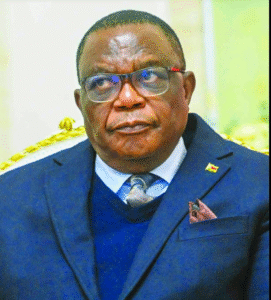SILENCE IS NOT AN OPTION: JOB SIKHALA’S CRY FROM CHIKURUBI TO GENEVA

Job Sikhala’s voice rang out from Geneva like a siren for the broken soul of Zimbabwe. Standing before the United Nations’ 16th Geneva Summit for Human Rights and Democracy, Sikhala, once a Member of Parliament and now a symbol of resistance, delivered a chilling yet powerful account of state brutality and political persecution in Zimbabwe. His words were not just testimony—they were a charge sheet against tyranny.
For 595 days, Sikhala was locked away in Chikurubi Maximum Security Prison, a place reserved for murderers and dangerous criminals—not for a lawyer whose crime was seeking justice for a slain woman. Moreblessing Ali, the woman he defended, was not just a murder victim; she was a warning to all opposition voices. Dismembered and discarded in a well, her body told a story of horror. Sikhala’s determination to represent her family in court marked him for punishment.
The regime did not hold back. His imprisonment was not due to guilt, but purpose—strategic, cold, and cruel. President Emmerson Mnangagwa’s government feared Sikhala’s influence. They feared his voice. And so they tried to silence it. What followed was an assault on every human right imaginable—solitary confinement, starvation, denial of medical care, and multiple bogus trials. At one point, even while gravely ill, Sikhala was shackled to a hospital bed like a wild beast.
But the repression did not end with him. His wife, Ellen Sikhala, was arrested in a cynical move to isolate him further. His law firm was dismantled. Students who protested for his release were thrown into jail. The message was clear: defending truth in Zimbabwe comes at a price.
Sikhala’s Geneva speech went beyond personal agony. He laid bare the systemic rot in Zimbabwe: a government that criminalizes thought, weaponizes hunger, and chokes dissent with an iron grip. This is not just about political opposition—it is about the erasure of democracy itself. New laws criminalizing criticism and shrinking civic space are turning Zimbabwe into an open-air prison.
Sikhala warned of a bleak future, particularly for the youth. He painted a picture of despair: collapsing education, rising drug abuse, and a society where the only currency is fear. As if man-made repression were not enough, nature is now punishing the country too. A climate-induced drought looms, and with it, starvation. Yet, under Mnangagwa, even foreign aid risks being looted and politicized.
His Geneva address wasn’t just a speech. It was a plea. A rallying cry. A demand for the world to act. He called on international institutions and ordinary people alike to support the National Democratic Working Group—a civic coalition striving to restore the democratic promise of Zimbabwe. He reminded us that the fight for human rights knows no borders.
Zimbabwe is burning under the heat of oppression. The silence of the international community only fans the flames. While the West negotiates trade and investment deals, Zimbabwean activists are tortured in dark cells. While global leaders pose for photo ops, students and widows cry out for help.
Job Sikhala’s words should haunt every conscience. His ordeal is not a story of the past; it is Zimbabwe’s present and potentially its future—unless the world wakes up.
In Geneva, Sikhala reminded us of something simple but profound: that injustice anywhere must be resisted everywhere. The price of silence is complicity. The cost of inaction is measured in broken bones and buried dreams.
Sikhala ended his address with a prayer, asking for divine blessings on all who still believe in justice. But what Zimbabwe needs now is not just prayers—it needs courage. Courage from its citizens. Courage from its diaspora. And courage from the world.
Job Sikhala has spoken. Now it is our turn to act.




Sikhala is not a hero, he is a troublemaker who brings shame to Zimbabwe. Running to Geneva to cry to foreigners is not patriotism. Real Zimbabweans solve problems at home, not by begging the West for help. This so-called speech is just another attempt to make Zimbabwe look bad. The country is rebuilding, and people like Sikhala only want to reverse progress. We must stay strong and reject these lies meant to destabilize us.
Job Sikhala’s bravery is unmatched. Speaking at the UN after facing nearly two years of brutal imprisonment shows his true strength. Zimbabwe needs leaders like him who will not be silenced by fear. We must all stand with him until Zimbabwe is free from tyranny.
The Geneva speech exposed everything the regime tried to hide. The world cannot pretend anymore. Zimbabweans are being tortured, jailed, and silenced. Sikhala’s voice is the voice of millions. Change must come, and it must come now.